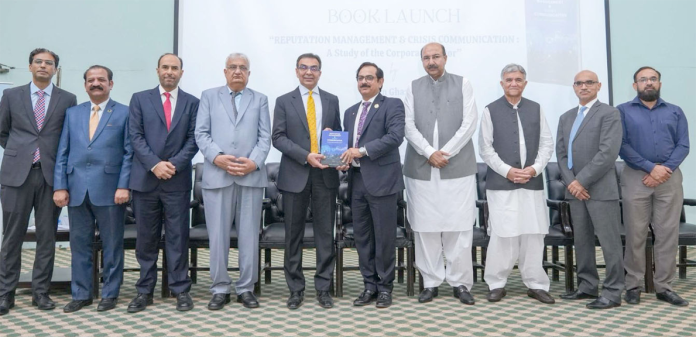Book on “Reputation Management and Crisis Communication” by Imran Ghaznavi Launched at National Skills University Islamabad
DNA
Islamabad – July 29, 2025: A prestigious book launch ceremony was held at the National Skills University (NSU) Islamabad to unveil “Reputation Management and Crisis Communication: A Study of the Corporate Sector”, authored by renowned communication strategist and media expert Mr. Imran Ghaznavi.
The groundbreaking publication, which delves into the increasingly vital field of reputation and crisis management in the corporate world, drew a distinguished audience that included senior bureaucrats, ambassadors, corporate leaders, regulators, academics, and media professionals.
The event began with a warm welcome address by Vice Chancellor Prof. Dr. Muhammad Mukhtar, who praised the timeliness and scholarly merit of the book. He emphasized the need for integrating such critical topics into mainstream education to equip future professionals with the tools to navigate today’s communication challenges.
Delivering the book review, prominent economist and public policy analyst Dr. Vaqar Ahmed highlighted the practical relevance of the publication for C-suite executives, board members, and communication professionals. He described the book as a valuable guide for organizations grappling with the fast-paced and often volatile media and digital environment.
Joining the ceremony via Zoom from the United States, Prof. Dr. Zafar Uddin Ahmed, President of the Academy for Global Business Advancement (AGBA), termed the book a landmark contribution from a Pakistani author to the global discourse on corporate reputation. Similarly, Dr. Javaid Laghari, former Chairman of the Higher Education Commission (HEC) of Pakistan, called it a “must-have” academic resource, particularly relevant for South Asian business schools and communication programs.
Mr. Mohammad Ali, Advisor to the Prime Minister on Privatisation and the chief guest on the occasion, emphasized the strategic significance of reputation in today’s hyper-connected, information-driven world.
“Reputation is a fundamental asset for any business, institution, or individual. It must be nurtured and protected from the top level of leadership,” he remarked. He advocated the creation of board-level committees dedicated to reputational risk and called for leadership training modules specifically focused on crisis communication.
Adding to the discourse, Mr. Shahzad Ahmed Malik, President of the Institute of Cost and Management Accountants of Pakistan (ICMAP), stressed the necessity of incorporating corporate reputation management into board governance frameworks. He strongly recommended including the subject in directors’ training programs to ensure leadership is equipped with the knowledge to anticipate and respond to reputational threats.
Prof. Dr. Syed Hafeez Ahmed of NSU delivered the concluding remarks and offered a heartfelt vote of thanks to the participants and contributors, emphasizing the value of such academic engagements for strengthening Pakistan’s thought leadership on global corporate practices.
In his closing reflections, author Mr. Imran Ghaznavi expressed gratitude to all attendees and contributors. He shared that the book is the culmination of years of professional experience, extensive research, and firsthand engagement in regulatory and corporate communication.
“In today’s digital era, where a single tweet or misstep can jeopardize the credibility of an organization or even a nation, reputation management is no longer optional—it is strategic,” he asserted.
The ceremony concluded with the official unveiling of the book, followed by a group photograph. The publication is expected to serve as an essential resource for business leaders, regulators, academics, and policy professionals who aim to understand and address the complex dynamics of reputation and crisis communication in the modern age.

















